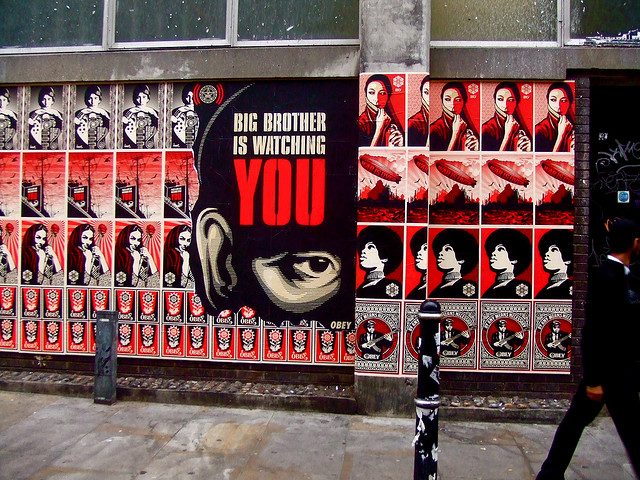Written under the supervision of Lisette Allen, M.A., and submitted on 5 May 2010, this essay was part of my total coursework at the Department of Anglophone Literatures and Cultures at Charles University’s Faculty of Arts. The essay is published with the kind permission of the faculty.
The Importance of Language in George Orwell’s Novels
Choosing a proper style is one of the most crucial aspects of writing. A whiff of colloquialism, despite being reader-friendly, might be viewed as a sign of sloppiness. At the same time, opting for overly formal language may make one indifferent to or detached from the reader, and texts rich with figurative language may be so pompous that their meaning is invariably lost under the layer of adjectives and metaphors. This essay will concentrate on the language of George Orwell’s Nineteen Eighty-Four, its impact on the readers’ perception of individual social classes and the book itself, and the issue of whether it would stand up to its scrutiny under the stylistic guidelines Orwell laid out in his essay “Politics and the English Language”. Additionally, Orwell’s literary development will be touched on, and the language of Nineteen Eighty-Four confronted with his other novels Burmese Days and Animal Farm.
Before anything else, however, we should pay some attention to the way Orwell himself approached language. As A. M. Tibbetts writes, “Orwell’s views on English were broadly and humanistically based” (Tibbets). Orwell was very fond of the English language and felt strongly about writers abusing it by their dishonest rhetoric and linguistic incompetence. He most explicitly expressed these opinions in his essay “Politics and the English Language” (Orwell, Politics). Despite his strong view regarding the correct use of language, however, Orwell did not have any more knowledge about its structure then any other average Briton would (Bolton, 21). He was doing his best, of course, but he was also aware of the fact that, as far as his stylistic development was concerned, he could never stop pushing his boundaries. Despite his struggles, he felt doubtful and even self-demeaning of his own writing style, which is clearly visible in the following quotation where the inability to express himself perfectly seems to have felt emasculating to him: “When I read a book like Ulysses and then come back to my own work, I feel like a eunuch [who] can pass himself off fairly well as a bass or baritone, but if you listen closely you can hear the good old squeak just the same as ever” (Bolton, 147). The attempt to reach aesthetic perfection was not the sole aim of his writing. Orwell states he writes particularly “because there is some lie I want to expose” (Orwell, Why I Write). For Orwell, the greatest sources of lies were totalitarian regimes. He wrote: “Every line of serious work I have written since 1936 has been written, directly or indirectly, against totalitarianism and for democratic socialism, as I understand it” (Orwell, Why I Write). Two of his most famous novels belong to this category: Nineteen Eighty-Four and Animal Farm. In both of them, Orwell uncovers the dangers of totalitarianism, and in both the use and abuse of language plays key part.
The importance of the language is a crucial theme in all his novels, of course. What is necessary to realize, though, is that Orwell’s writing developed over time. When thinking about the style and language of his first novel, Burmese Days, Orwell had a clear idea in mind: “I wanted to write enormous naturalistic novels with unhappy endings, full of detailed descriptions and arresting similes, and also full of purple passages in which words were used partly for the sake of their own sound” (Orwell, Why I Write). Some of these resolutions, such as the use of similes or the nature of the endings, remained throughout his writing unchanged but especially Burmese Days bears the signs of so-called purple prose, “the style of writing that tends to be so extravagantly worded that you really have very little idea of what is actually being said” (Joyce). Consider, for instance, the lengthy description of one of the characters here: “He was an erect, narrow-shouldered man, very tall for Burman, with a curiously smooth face that recalled a coffee blancmange” (Burmese Days, 5). Not only is this description unnecessary but the number of adjectives is so high the reader might get lost in the sentence, even despite its shortness. To be fair, Orwell knew about these imperfections and on the behalf of his early work he wrote: “I see that it is invariably where I lacked a political purpose that I wrote lifeless books and was betrayed into purple passages, sentences without meaning, decorative adjectives and humbug generally” (Orwell, Why I Write). We must not think that this was his condemnation of his first fruits. He knew that it is inevitable for any writing style to change. He merely believed that “by the time you have perfected any style of writing, you have always outgrown it” (Orwell, Why I Write). In the light of this statement, Animal Farm marked a major shift in his career. Orwell stopped using overblown language and decorative adjectives and his work, therefore, became more precise in its meaning. While merely testing this approach in Animal Farm, it culminated in Nineteen Eighty-Four.
It would be rather hypocritical of Orwell to, on one hand, denounce certain approaches to language, certain words and figures of speech, and on the other use them in his own work. We should, therefore, ask whether in Nineteen Eighty-Four he obeys the rules established in “Politics and the English Language”. In the essay, Orwell condemns the use of the passive, double negation, overused metaphors and foreign and meaningless words but, above all, he fights against the tendency to replace the concrete for the vague. Thankfully, vagueness of expression is something not to be found in Nineteen Eighty-Four. The book is more than precise in a sense that what could be said euphemistically is described in a very clear fashion. For example, when pondering about the purpose of the Ministry of Love, the narrator says: “One did not know what happened inside the Ministry of Love, but it was possible to guess: tortures, drugs, delicate instruments that registered your nervous reactions, gradual wearing-down by sleepiness, and solitude and persistent questioning” (Nineteen Eighty-Four, 137). This is what Carl Freedman calls “dogmatic distrust of generalization and an extreme preference for the particular” (Freedman). The author could have simply stopped and use some euphemism instead of the concrete list of cruelties, but then the message of the text would not be nearly as powerful, and would not invoke as strong a reaction of fear and contempt in the readers.
The preciseness of the text is not just a matter of saying everything outright. There are virtually no ambiguous double negations and also the use of passive is rather scarce. It even seems that whenever the passive is used, it has some negative connotation, as for instance in the sentences: “people who had been vaporized” (Nineteen Eighty-Four, 37) or “phrase that was generally used for children who denounced their parents to Thought Police” (Nineteen Eighty-Four, 23). This observation is also valid in Animal Farm where the scarcely employed passive is used for example in connection with evil Napoleon’s rival who “was not considered to have the same depth of character” (Animal Farm, 26) or the twisted Commandments which “were written on a tarred wall” (Nineteen Eighty-Four, 32).
The only foreign expression in Nineteen Eighty-Four has a negative connotation, too. The excerpts from Goldstein’s book are already ostentatious for their heavy use of Latinate words, but when the expression “lingua franca“ (Nineteen Eighty-Four, 168) comes, it immediately catches the attention of anybody who is familiar with “Politics and the English Language”. It almost seems as if the expression was a sort of an omen and sure enough, only moments after the character finishes the reading, he is arrested and sent for torture.
The use of lyrical language is rather rare in order to preserve the raw quality of the text. Apart from a couple of instances of a bit more lyrical expressions such as “[a bird] pouring its music into nothingness” (Nineteen Eighty-Four, 102), the only cases of the employment of figurative language are the short and often striking similes. For instance, Julia’s revolt against the Party is described as “natural and healthy, like the sneeze of a horse that smells bad hay” (Nineteen Eighty-Four, 101), the children’s informer game as “frightening, like a gamboling of tiger cubs which will soon grow up into man-eaters” (Nineteen Eighty-Four, 22) or a pregnant woman as “swollen like a fertilized fruit” (Nineteen Eighty-Four, 176). Sometimes, Orwell even uses slightly informal, violent language in order to remain unequivocal. When describing the taste of gin, he writes: “The stuff was like nitric acid, and moreover, in swallowing it one had the sensation of being hit on the back of the head with a rubber club” (Nineteen Eighty-Four, 108). The favour in the use of similes, although not nearly as striking and often clichéd ones, is visible also in the rest of Orwell’s novels. In Burmese Days there are similes such as “mud, glistening like a chocolate” (Burmese Days, 168) or “lumps hard as concrete” (burmese Days, 239) and in Animal Farm as ”earth like iron” (Animal Farm, 52) or “go like clockwork” (Animal Farm, 36).
In Nineteen Eighty-Four, the language also plays an essential role in morally distinguishing between the good and the bad. While discussing this topic, however, we have to realize that “language manipulation is a neutral, natural human activity” and that “any goodness or badness depends on the context of the whole situation” (Rank). Even under these circumstances, choosing sides is fairly easy. Simply put, the main characters speak ordinary, easily understood English and are therefore more likely to be perceived as likeable; “Proles” are depicted as “the dumb masses” (Nineteen Eighty-Four, 168) and are therefore given less understandable and, in a way, pitiable Cockney accent and members of the Party are in their speech gradually moving toward the despicable ideal of Newspeak (Bolton, 143).
There are several aspects of this newly created language that show why Orwell thought this to be the worst-case scenario in the development of his mother tongue. Firstly, Newspeak is build entirely upon the simplification of human speech and destroying words with any precise meaning. One of the characters even remarks with pride: “We’re destroying words – scores of them, hundreds of them, every day. We’re cutting the language down to the bone” (Nineteen Eighty-Four, 44). The reason for this may be that “if you don’t have the word available for an idea, you have trouble thinking of it” (Tibbets). The corruption of language and mind essentially go hand-in-hand. Therefore, the creation of Newspeak is merely the Party’s attempt – although not particularly successful so far – to control its members by removing their ability to question its actions. A good example of generalization so wide that the meaning is almost completely lost is in a report that the main character overhears in a pub: “I am authorized to say that the action we are now reporting may well bring the war within measurable distance of its end.” There is no valid information contained in this report – “the measurable distance” is so imprecise an expression that any inkling of the actual time-frame is virtually non-existent.
Secondly, the most preferable tool of writing in Newspeak is the use of ready-made phrases. For Orwell, this is one of the greatest sins people can commit that shows their disrespect for the language. In the novel, he explicitly writes: “[There were] printed postcards with long lists of phrases, and you struck out the ones that were inapplicable” (Nineteen Eighty-Four, 91). Once again, the less effort people have to make while writing, the less they think, and the better for the Party.
Ironically enough, as Carl Freedman points out, there are a few common links that bind together Newspeak and the preferable language of “Politics and the English Language”. First, in the essay, Orwell denounces the unthinking use of general words such as democracy, justice or science which are “strictly meaningless in a sense that they do not point to any discoverable object” in favour of more precise expressions. Similarly, Newspeak banishes most of these general or ambiguous words, while creating specific abbreviations of the others such as Ingsoc, artsem or Miniluv. Secondly, the same as Orwell advises in the essay to cut any word out if possible, Newspeak regards the reduction of vocabulary as an end in itself (Nineteen Eighty-Four, 242). In both cases, these endeavors result in a reduction of vocabulary. Needless to say, though, that they do so from completely opposite reasons. Orwell must have believed that the simplification of the language is a double-edged sword. On one hand it could be used for making people think less, making them submissive and controllable. On the other hand, if used for a good cause, it could work as a perfect eye-opener for the blind and the ignorant who refuse to see the common threat.
Before the coming of the 1936 Spanish Civil War, the outbreak of the Second World War, and the consequent danger of totalitarian regimes, Orwell was a sort of an idealist, but he soon became disillusioned. In order to warn of the perils of Communism, he developed a special language, very clear in its expression, unbiased and honest. He changed so that his readers would realize the danger and change their beliefs and behavior as well. It may be arguable that what he did was essentially a personal propaganda which he used to persuade the society of his own beliefs – pretty much the same kind of propaganda he actually militated against. In a sense, it is a relevant objection but then we must realize that his propaganda was somewhat different, somewhat special. George Orwell was essentially a propagandist for the good.
Bibliography
Bolton, W. F. The Language of 1984. The University of Tennessee Press: Knoxville, 1984.
Foley, J., and Ayer, J. “Orwell in English and Newspeak: A Computer Translation”. College Composition and Communication. February 1966. Vol. 17, No. 1: 15-18. Accessed by <www.jstor.org>
Freedman, Carl. “Writing, Ideology, and Politics: Orwell’s ‘Politics and the English Language’ and English Composition”. College English. April 1981. Vol. 43, No. 4: 327-339. Accessed by <www.jstor.org>
Joyce, Julie. „Purple Prose and Link-Building.“ Search Engine Journal. 17 April 2010. 17 April 2010. <http://www.searchenginejournal.com/purple-prose-and-link-building/16426/>
Orwell, George. Animal Farm. Hartcourt Brace Jovanovich: New York, 1971.
Orwell, George. Burmese Days. Penguin Books: London, 1989.
Orwell, George. Nineteen Eighty-Four. Penguin Books: New York, 1982.
Orwell, George. “Politics and the English Language”. 24 July 2004. 11 April 2010 <http://www.orwell.ru/library/essays/politics/english/e_polit>
Orwell, George. “Why I Write”. 24 July 2004. 11 April 2010 <http://www.orwell.ru/library/essays/wiw/english/e_wiw>
Rank, Hugh. “Mr. Orwell, Mr. Schlesinger, and the Language”. College Composition and Communication. May 1977. Vol. 28, No. 2: 159-165. Accessed by <www.jstor.org>
Tibbetts, A.M. “What Did Orwell Think About the English Language”. College Composition and Communication. May 1978. Vol. 29, No. 2: 162-166. Accessed by <www.jstor.org>





Napsat komentář